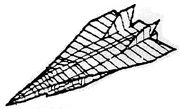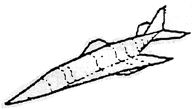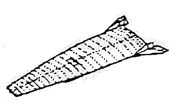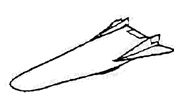|
|
We have looked at several past, current, and future vehicles pushing the envelope of
hypersonic flight. Although few have actually flown, the desire for practical flight vehicles operating at high
Mach speeds seems to be slowly increasing. Perhaps within the next generation, a vehicle like one of those
summarized below will finally take to the skies.
Potential Hypersonic Vehicle Applications
|
Tactical
Fighter-Bomber
|
Military/
Commercial
Transport
|
| Cruise Mach number |
4 |
5 |
| Range [NM] |
2,000 |
6,000 |
| Propulsion |
Turbojet or Ramjet |
Turbojet or Ramjet |
| Configuration |
 |
 |
|
Long-Range
Cruiser
|
Single-Stage
to-Orbit (SSTO)
Vehicle
|
| Cruise Mach number |
10 |
20 |
| Range [NM] |
10,000 |
Orbital |
| Propulsion |
Ramjet or Scramjet |
Scramjet and Rocket |
| Configuration |
 |
 |
Although few hypersonic vehicles have ever flown, many factors seem to be pushing for flight at ever increasing
speeds. Perhaps an Air Force bomber, a NASA single-stage-to-orbit vehicle, or a hypersonic airliner will be the
first aircraft to make hypersonic flight a practical reality. Whatever type of vehicle it is, a hypersonic
aircraft will likely be a waverider. With its inherent aerodynamic advantages, due to
compression lift and ease of propulsion
integration to improve engine thrust, the waverider offers perhaps the most efficient means of travel
at speeds of Mach 5 or more.
Regardless, much additional work needs to be done to build a database of actual flight-test data so that hypersonic
vehicles can be designed and manufactured. In addition, this site has shown the importance of developing
multi-disciplinary design approaches. Unlike traditional aircraft designs in which interaction between propulsion
systems and aerodynamics is limited and the effect of friction heat on structures is negligible, these and other
disciplines are exceptionally interconnected in hypersonic flight. With such a scale of complex interactions,
multi-disciplinary optimization techniques will become critical in designing realistic and efficient hypersonic
vehicles. We can only hope that vehicles like the experimental Hyper-X will begin the process of making
hypersonic flight practical, safe, and cost-effective.
|


